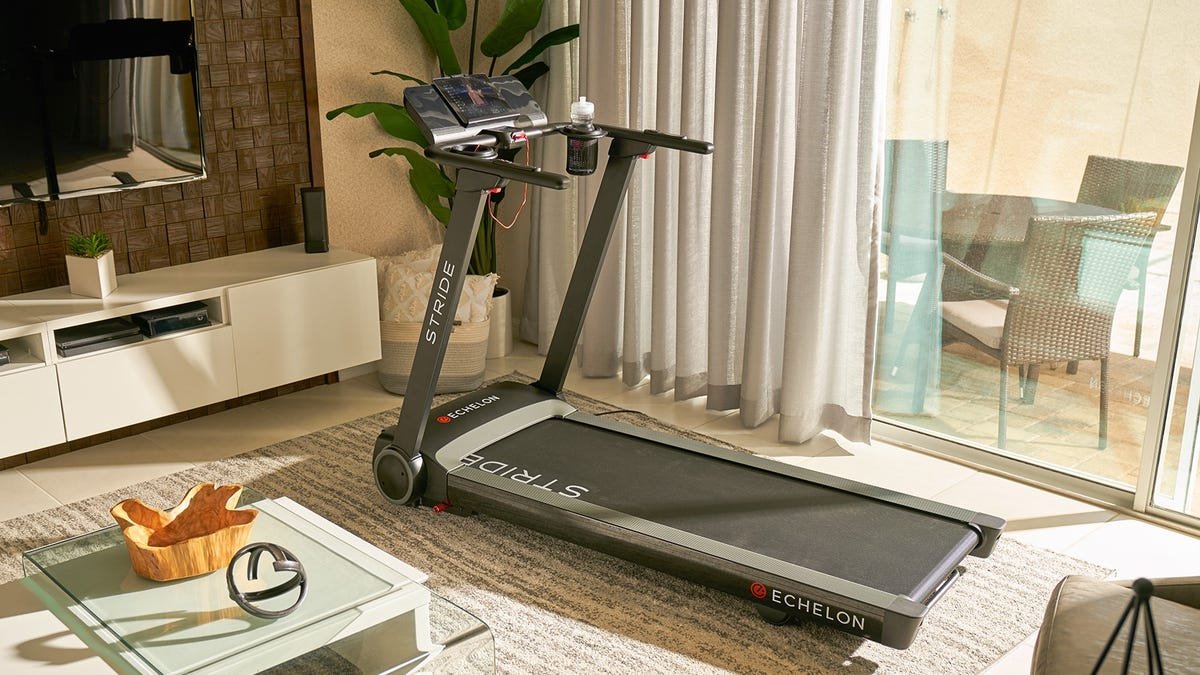
Best Treadmills for Home of 2023 – CNET
[ad_1]
As someone who doesn’t particularly love outdoor running in the colder months, a treadmill fulfills my desire to run without dealing with the winter elements. Whether you’re a runner or simply enjoy walking, a treadmill is a helpful piece of exercise equipment to get some steps in the comfort of your home.
A well-rounded workout routine includes a form of cardio, and a treadmill is a guaranteed way to get some cardio in. The treadmills available for home use have also become more technologically advanced than what you traditionally find at the gym. They vary based on whether they have a touchscreen, which workout programs are offered or even how practical the design of the treadmill is.
We tested different types of treadmills on the market to determine which are worth buying, who they are best for and what to consider before making a purchase. Take a look at our top picks below.
What is the best overall treadmill?
With all the treadmills on the market it can be hard to pick just one. But the NordicTrack Commercial 2450 ended up proving to be the best of the many tested. This high tech treadmill has a large screen, options for walking and running on an incline or decline, you can create your own running route using Google maps and it even has an AutoAdjust feature which allows an instructor to automatically change your incline and speed during class. More expensive treadmills like the Peloton tread don’t offer exclusive features such as these. Additionally, the NordicTrack Commercial 2450 can be stored upright using the easylift assist if you need more room when it’s not in use.
Best treadmills for 2023, compared
| Treadmill | Maximum speed | Maximum incline | Maximum user weight | Price |
|---|---|---|---|---|
| NordicTrack Commercial 2450 | 12 mph | 15% | 300 pounds | $2,799 |
| Bowflex Treadmill 10 | 12 mph | 15% | 400 pounds | $2,000 |
| Echelon Stride | 12 mph | 10% | 300 pounds | $1,300 |
| Horizon 7.0 AT | 12 mph | 15% | 325 pounds | $999 |
| Peloton Tread | 12.5 mph | 12.5% | 300 pounds | $3,495 |
Read more: How to Beat Boredom on the Treadmill
NordicTrack has a reputation for being one of the leading brands in treadmills so it’s no surprise that our top overall pick is the NordicTrack Commercial 2450, NordicTrack’s newest addition to its commercial treadmill series. This treadmill is all black with a sleek design that would look good in a home gym space.
The Bowflex Treadmill 10 is ideal for those looking for a heavy-duty treadmill. It has the highest weight capacity of all the treadmills on this list at 400 pounds — most cap out at around 300 pounds. It’s also the biggest one on the list, measuring 85 inches long by 39.6 inches wide and 65.3 inches tall. According to our technician, assembly took about three and a half hours and can be tedious because of the different pieces you have to install. Bowflex does offer shipping with assembly included for an additional $349.
This compact but mighty treadmill is our top pick for small spaces. Unlike the rest of the treadmills on this list, the Echelon Stride was made with limited space in mind. It has an all black exterior and looks sleek so it will blend into any room. It only took our technician 15 minutes to set up, so it should be easy to assemble without taking up much of your time. This treadmill is best for someone on the shorter side since the spacing between the arms and treadmill feels more narrow compared to the Bowflex and NordicTrack treadmills. The belt is also shorter, measuring only 55 inches long. It has a 300-pound weight capacity, which is impressive considering its size. It could pass for a walking treadmill because of how slim it is, but during testing I was able to comfortably walk and run on it. The speed goes from 0.5 to 12 miles per hour and has a max 10% incline. The speed capabilities are in line with the bigger treadmills, however, the incline is not as high, and the Echelon Stride doesn’t have a decline option.
You’re receiving price alerts for Echelon Stride
The Horizon 7.0 AT treadmill looks like a commercial treadmill found at the gym without the bells and whistles. It’s also fairly priced and the only treadmill on this list under $1,000. This treadmill took our technician two hours to assemble, but you have the option of white glove delivery and assembly for an additional $269. You will need to make sure you measure out the space in your home since this treadmill is big, measuring 76.5 inches long and 36 inches wide. It’s not as big as the Bowflex or NordicTrack, but it still takes up space. It does fold up, but similar to some of the other treadmills on this list, you still need to make sure you have enough room to store it upright.
If you’re familiar with Peloton’s exercise equipment, then you know it all shares the same black sleek exterior with touches of red. The Peloton Tread is no different, but its stand out feature is the 23.8-inch HD touchscreen. This makes it the treadmill with the biggest screen on this list. The Peloton Tread will require plenty of room since it is large and doesn’t fold up. It’s 59 inches long so it can appropriately fit people of all heights, and you can tell by the width and length of the belt that it can comfortably fit someone over 6 feet tall. It has a 300-pound weight capacity. The Peloton Tread can go up to 12.5 miles per hour with one mile per hour increments. It also has a maximum 12.5% incline, but no decline option. Its competitors NordicTrack and Bowflex have the ability to decline, so I was surprised that Peloton’s was lacking there.
How we test treadmills
Design: We looked at the design of the treadmill and what it’s like to use, including screens, buttons, handles and more. We also observed noise volume and feel when in use.
Features: We took stock of each treadmill’s list of features, whether traditional or more advanced, in order to determine who it’d be best suited for. We looked at the max incline and decline settings the treadmill offers. We also looked at the speed ranges provided and if there’s enough variety for both running and walking.
Functionality: We tested each feature to see how well it does what it’s supposed to do. Does the machine lag or not connect the way it should? How does it handle changes in speed or higher-intensity exercise?
Price: We tested treadmills with various price points, from budget models to more expensive and high-end machines.
Size: We considered the size of the treadmill, what type of people it can accommodate and if it’s appropriate for home settings. We also looked at whether it can fold up partially or completely.
Other treadmills we tested
ProForm Pro 2000: Although ProForm and NordicTrack are manufactured by the same company, I found that the quality of the ProForm did not compare. During testing I was unable to connect my iFit account and the belt did not feel smooth when in use and kept making squeaking sounds — even after our technician adjusted it multiple times.
Mobvoi Home Treadmill: Putting together this compact treadmill at home wasn’t too complicated, but I noticed some manufacturer defects in the alignment of the handles. Although this didn’t affect the ability to use the treadmill, I found this one was better off used for walking instead of higher-impact activities like running or jogging. While jogging on the treadmill I noticed it made loud thumping noises that can be a nuisance if you live in an apartment. The belt is also narrow, therefore I don’t think it would be an appropriate pick for taller or larger people.
Factors to consider when choosing a treadmill
- Set yourself a budget and decide how much you’re willing to spend on a treadmill since they can be expensive.
- Determine if you want a smart treadmill with a touchscreen or if you prefer a screen that provides basic metrics.
- Consider the size of the treadmill and how much space you have in your home to fit one.
- Decide if you want the treadmill to be foldable for saving space and easy storage.
- Decide if you’re OK with a treadmill that makes some noise or if you prefer it to be silent.
- Determine if you plan on using it more for running than walking or vice versa.
- Consider if multiple people in your household will be using the treadmill and if you need one that can handle various heights and weights.
How to care for your treadmill
If you want your treadmill to last a long time, you’ll need to do some maintenance to keep it in good condition. You will need to clean your treadmill to keep it debris-free with a cleanser that’s appropriate for gym equipment. Sometimes the treadmill manufacturer will sell the best cleanser for their product on their website. Making sure the safety key (usually found on all treadmills) is fully functioning is also important to make sure your treadmill is still safe to use. And according to ProForm, you should check on a monthly basis that the tread belt still has tension and is properly aligned. Usually the instructional manual will include information on how to adjust your treadmill belt. Additionally, inspect the power cord for any potential damage and check that the bolts and screws on your treadmill are still screwed in tight. Over time and use, some of these pieces can come loose so they may need to be tightened up occasionally.
Another aspect to look at is if the treadmill needs lubrication. When you purchase your treadmill, you’ll notice that your package probably came with a small tube of lubrication. This is to keep the treadmill belt in good condition since the lubrication can dry up over time. According to NordicTrack, if the treadmill isn’t properly lubricated it can affect the way it works by making the belt stick and can even cause it to overheat. For proper instructions on how to lubricate your treadmill, adhere to the instruction manual or call the manufacturer’s customer service number for assistance.
Finally, if you’ve done all the inspections required and notice that your treadmill belt is worse for wear, it may be time to replace it. Make sure you have the model number of your treadmill on hand before reordering a replacement belt. Follow the instructions on the manufacturer’s website or owner manual to make sure that you’re installing it correctly.
Treadmill FAQs
Which is better: A treadmill or elliptical?
How do you lubricate a treadmill?
According to NordicTrack, you’ll need to buy a nonsilicone-based treadmill lubricant from the treadmill supplier. Follow its recommended steps to properly lubricate your treadmill.
How much do treadmills cost?
The cost of a treadmill will depend on the type and quality of treadmill you’re looking for. You can find treadmills under $1,000, but they may lack the sturdiness and capacity that a more expensive option provides. If you want a treadmill with special features you can expect to spend upwards of $1,000, with more expensive models ranging anywhere from $3,000 to $5,000.
How long do treadmills last?
Is a treadmill bad for your knees?
Running on a 0% incline or high incline can increase your chances of injuring your knee and shin splints or other issues. According to orthopedic surgeon Kevin D. Plancher, running at lower inclines is safer for the knees. He suggests running at a 1 to 3% incline to prevent unnatural movement patterns that normally occur at a 0% incline setting. This helps relieve pressure from the knees and instead ends up working more of your glutes and hamstrings.
[ad_2]
Source link


